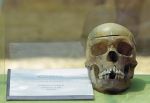by Michelle Paul
Associated Press Writer
WINDHOEK, Namibia (AP)—Human skulls taken from Namibia by German colonizers returned home Oct. 4 after more than 100 years, but the reconciliatory gesture instead has ignited anger and renewed demands that Germany pay for its sins in this corner of Africa where more than 60,000 people were killed.
Tuesday’s return of 20 skulls taken to Germany more than a century ago for racist experiments also has fueled anger about current injustices by a people decimated when they rebelled against German colonizers.
 |
| HOLOCAUST REMINDER—A skull from Germany on display in the city of Windhoek, Namibia, Oct 4. (AP Photo/Schalk van Zuydam)
|
Historians say the genocide committed by German soldiers in what they called South West Africa was a precursor to the Nazi Holocaust of the Jews.
The Herero people numbered more than 85,000 and were the most powerful and richest with herds of tens of thousands of cattle roaming a third of the country when Germany began its colonial adventure here.
When the Herero rose up, the slaughter began. Within three years, 85 percent were dead, their land and cattle stolen, some bodies beheaded.
Today, the Herero make up perhaps 10 percent of Namibia’s population of 2.1 million—and some still dispossessed of land are threatening to invade farms being worked by the descendants of the White settlers who seized it more than 100 years ago.
University professor Hoze Riruako, a senior adviser to the paramount chief of the Herero, warned that the tribe’s patience was running out.
“If something is not done, we cannot guarantee that you will not see the same kind of land grabs that you see in Zimbabwe,” where government-sanctioned violence has forced out most White farmers and a one-time food exporter has become dependent on food aid.
Most successful Black commercial farmers in Namibia are Herero, though their numbers are small. Most commercial farmland and the economy and industry remain in the hands of Whites.
Prime Minister Nahas Angula denied there was any discrimination, saying land and services are scarce for all Namibians. He said many people were overwrought by their emotions: “This history is still fresh in the memory of many people and this is generating an understandable passion and anger.”
In his office overlooking Parliament Garden, where traditional chiefs were recounting their people’s tragic history, Angula gave a brief version to a reporter.
He said the Namibian skulls sent to Germany first were ordered around 1903 by Eugen Fischer, the Nazi anthropologist who believed he could prove that Blacks were inferior to Whites by measurements of their cranium.
To fill the order, German troops made the Herero dig up the graves of relatives and ancestors.
When the Hereros rebelled and killed more than 100 German troops, Gen. Adrian Dietrich Lothar von Trotha issued his infamous order that “the Herero nation must now leave the country. If it refuses, I shall compel it to do so with the ‘long tube’ (cannon). Any Herero found inside the German frontier, with or without a gun or cattle, will be executed. I shall spare neither women nor children.”
German troops drove the Hereros into the desert, where they poisoned the wells. Stragglers were bayoneted to death or burned alive en masse on human pyres. Some escaped to modern-day South Africa and Botswana. Some were spared to serve as slave labor and sex slaves in concentration camps, where thousands more died.
Thousands of Namibia’s Demara and Nama people also were killed when they rebelled.
Yale University Historian Benjamin Madley, in a dissertation titled “From Africa to Auschwitz,” argues that this mass murder of civilians, with impunity and in defiance of European martial codes, corroded German military morality and set the scene for even more extreme crimes by Hitler in Eastern Europe.
It was not until 2004, on the centenary of the German-Herero war, that Germany apologized, acknowledging “political and moral responsibility for the past and colonial guilt.”
But successive German governments have carefully refrained from admitting there was a genocide and refuse to pay reparations, pointing instead to generous development aid. Germany has announced development aid of 127 million euros ($188 million) for 2011-2012.
At the airport when the skulls arrived Tuesday, Angula indicated it was time to move on, saying: “The Namibian nation accepts these mortal remains as a symbolic closure of a tragic chapter.”
That sentiment was not shared by the many Hereros who keep alive through oral history the tragedy of their nation and who still sing the war songs chanted by ancestors who fearlessly confronted German cannons with their spears, arrows and a few rifles.